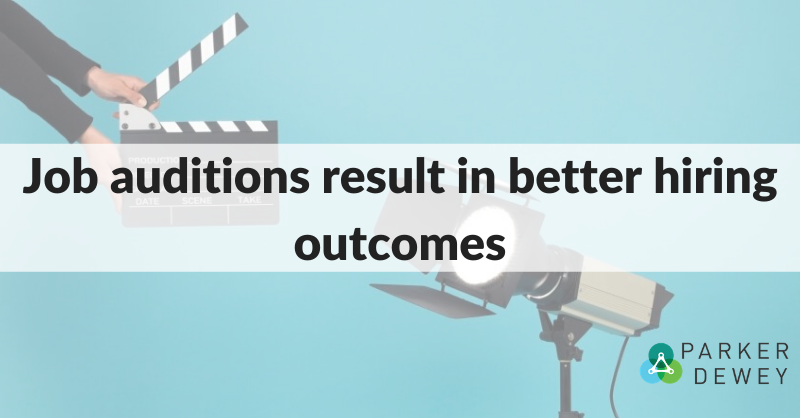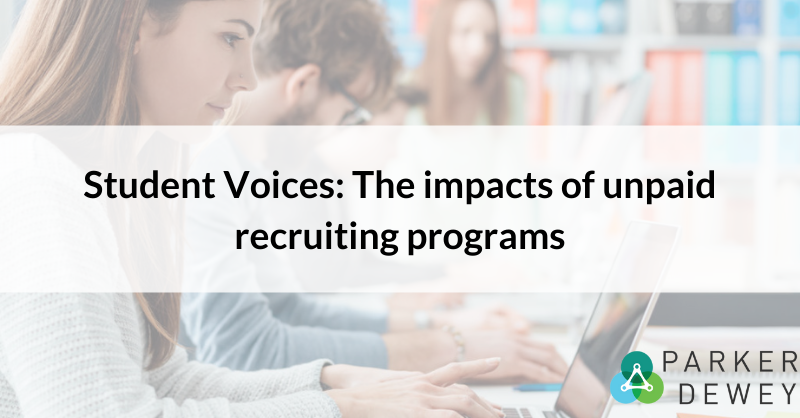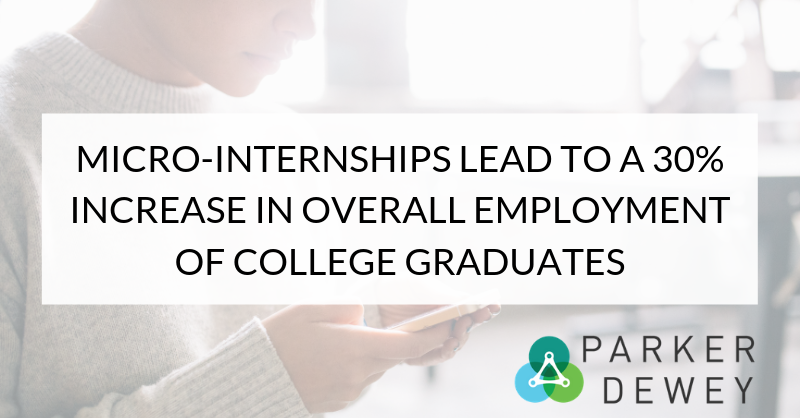
Job Auditions: The Job Interview Will Soon Be Dead
The traditional job interview process is continuously failing employers and future employees. It is not sufficient to determine if a candidate has the core skills needed for a position and candidates are not able to assess personal fit at the company. The interview is simply not enough, which is why Marcel Schwantes, explains how companies are adopting the job audition model in his article: The Job Interview Will Soon Be Dead. Here's What the Top Companies Are Replacing It With.
The benefits are mutual - companies get to see candidates in action while giving them a taste of what their day to day job and company could look like. The article describes the job audition model for mid-level hires, while Parker Dewey focuses on entry-level hires and serves as a platform to connect Career Launchers and Employers that want to hire for skill and fit over GPA utilizing Micro-Internships.
This post originally appeared on Inc.com, and is re-published with permission from the author.
Most companies rely on the traditional in-person job interview to make hiring decisions. But I'm here to tell you, it doesn't work. In fact, it's a terrible tool.
Here's why: 81 percent of people lie during the interview. No joke, 81 freaking percent!
That's according to Ron Friedman. He is an award-winning social psychologist and the author of The Best Place to Work, which should get on your Amazon wish list.
Friedman says we are creating a condition where people are being dishonest because, well, plain and simple, it's the only way for them to get a job.
In other words, lets say I'm interviewing for one of your jobs. If you ask me about a skill I don't have, it's pretty clear that if admit that I don't have that skill, I'm not going to get the job. The only option I have is to talk around it and give you, my potential boss or colleague, a false impression. The result: Employers are consistently getting spoon-fed dishonest answers, and they're eating it up like candy.
How Our Brains Sabotage Us During Interviews
This is now adding insult to injury, but think about it: Even if you were getting 100 percent honest answers from a job candidate, there's a real question about whether you would be accurately evaluating the person in front of you.
Friedman says this is because of the ways our brains operate. We have unconscious biases when we look at other people and evaluate their skill set. Chances are you've probably interviewed an attractive female, a tall person, or someone who speaks with a deep voice. Here's what science is saying on each, according to Friedman:
- People who are good looking tend to be evaluated as being more competent, intelligent, and qualified than their less attractive colleagues, despite not being objectively better at any of these things.
- People who are taller tend to be evaluated as having more leadership skills than their shorter counterparts. The same results also held for women, though the effect was not as large. Also, decades of data have revealed a clear relationship between height and salary at every age.
- People who speak with a deeper or lower-pitched voice are viewed as possessing greater strength, integrity, and trustworthiness.
Friedman says that if you, as the interviewer, assume that a job candidate is extroverted, you're going to ask you a question like, "Tell me your experience leading groups."
But if you assume that a job candidate is introverted, you might ask a slightly different question, like, "Are you comfortable leading groups?"
While both of these questions may be getting at the same topic, Friedman says when interviewers frame these questions differently due to their assumptions about a job candidate, it leads that person to answer in a way that confirms your (the interviewer's) initial impression or bias, which may be dead wrong.
The Solution: Job Auditions
Friedman's argues that we should disrupt the HR process of live, in-person interviews and replace them with "job auditions" that are relevant to the tasks for the job.
It makes sense. Musicians and singers have to audition. Actors have to audition. The people employing them don't sit down and dart scripted questions their way. They want to see them play, sing, perform. Doesn't it make sense to audition a prospective employee for the same reasons, before they sign an offer letter?
For example, if you're looking to hire a sales rep, bring the candidate in for a few hours and have that person sell you and members of your team on your product.
If you're hiring Web designers, bring them in and have them design a landing page for you.
In either case, your first impression will be based on seeing them do their job, rather than how well they're answering your scripted questions. The same goes for behavioral interviews.
The data from Friedman's research confirms that when we choose auditions versus interviews, we can create a far better approach to hiring people, and a better workplace that has the right people you want for your jobs and your culture.
Continue reading The Job Interview Will Soon Be Dead on Inc.com.




